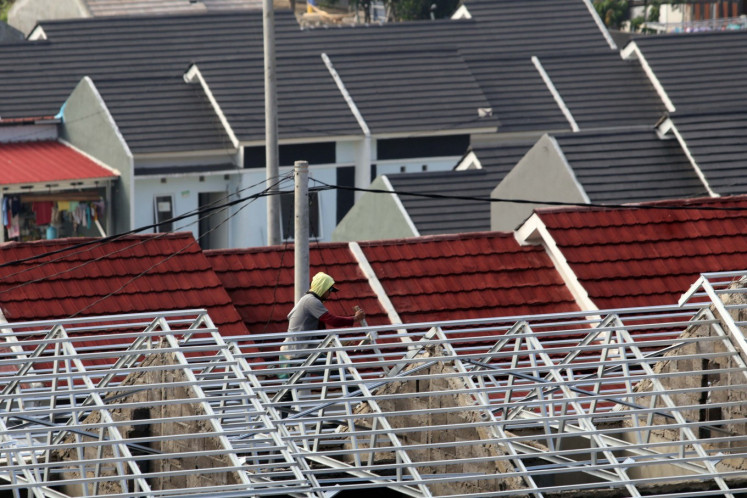Popular Reads
Top Results
Can't find what you're looking for?
View all search resultsPopular Reads
Top Results
Can't find what you're looking for?
View all search resultsAndreas Treske: Learning about cultures through film
In the center room at the Indonesian Visual Art Archives (IVAA) in Keparakan, Yogyakarta, youths engaged in documentary filmmaking sat in a circle
Change text size
Gift Premium Articles
to Anyone
I
n the center room at the Indonesian Visual Art Archives (IVAA) in Keparakan, Yogyakarta, youths engaged in documentary filmmaking sat in a circle.
A tall man in a white T-shirt, seemingly plagued by the oppressive heat, watched from the corner.
That man was Andreas Treske, a theoretician, media artist and filmmaker who once lectured at Bilkent University in Ankara and is now assistant professor at Yasar University in Izmir, Turkey. A familiar name in the film business, his short pictures have frequently been featured at various international film festivals.
The German gentleman was providing his input at a filmmaking workshop as the final agenda of the Video Vortex#7 program, a satellite meeting of the Video Vortex Network in conjunction with the recently concluded Cellsbutton#5 — Institutional Cells program of the Yogyakarta International Media Art Festival 2011.
The co-organizer of Video Vortex#7, David The, said the event focused on online video methods. So far, Video Vortex programs have been held in Europe and Turkey.
“This is the first time Video Vortex went to the east,” David added. Apart from the workshop, the program included a seminar, screenings and artist talks, with many young film enthusiasts joining.
At the noon workshop, Andreas shared his method of creating non-linear film plots. Conveying his ideas in a relaxed manner, he also encouraged workshop participants to actively argue and express their views.
“I show the way to think about the story in which not everything goes straight. So it can go around, it can start from the back or from the middle,” said Andreas, who was once a creative employee in the film, post digital production and multimedia departments of the Film Academy in Munich, Germany.
According to Andreas, a film produced by the interactive game design theoretical technique will be interesting instead of boring. Although a bit intricate, the audience will be engrossed in the story being presented.
“The film is like a game, with its storyline hopping around, thus allowing one to choose which plot to start,” said Dwi Sujanti Nugraeni, a documentary filmmaker from Yogyakarta taking part in the workshop.
Andreas was an important resource at the Video Vortex program in Yogyakarta. He also delivered a lecture at Sanata Dharma University that was titled “Spheres and Bubbles: Applied Aesthetics of Network Video”.
As a German living in Turkey, Andreas has also actively boosted mutual understanding between the European Union and Turkey. As a neighbor, the European community isn’t overly aware of Turkey’s socio-cultural life, he said.
He was also one-time chairman of the steering committee of the program “Toward a Deeper Understanding of Rural Europe”.
In the project, several filmmakers were funded to produce anthropological pictures depicting the lives of rural communities in Europe and Turkey from 2008 to 2010. When the films were screened in rural areas in Europe and Turkey, both communities enhanced their mutual understanding and friendship.
Andreas believes that community members can learn about themselves through film, like the soccer fan who created a documentary portraying the emotions of supporters of Turkey’s famous soccer club, Fenerbahce, which was screened in 50 theaters in Turkey in 2005.
“Because I like soccer,” he said with a smile when asked why he made the documentary. However, Andreas also sees soccer buffs as an important part of a culture. From the film, Turkish people “can learn about their life, about love, energy, mentality and that this is their country, their space. If they don’t like it, they learn to accept what they don’t like,” he said.
In the year-long production, he loaned cameras to several fans so they could record their peers’ emotions when they watched their favorite soccer clubs. There were screams, cries, cheers and other stirring expressions.
Besides meeting with film and video makers during his four-day stay in Yogyakarta, Andreas also had the opportunity to observe elements of Javanese culture. In his opinion, the Javanese community is remarkable, vibrant and energetic.
Cherishing the hope to delve further into Javanese culture, the father of one said, “I will come back to learn more — not to make a film but to talk to people.”
Andreas, who returned to Turkey following the workshop, also expressed his desire to view and collect Indonesian films.










